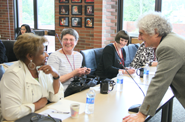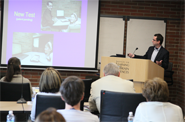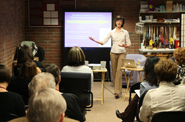On May 25, 2011 I-LABS hosted members of the Kellogg Foundation in their annual Learning Labs conference held in Seattle. Learning Labs is an initiative of the Kellogg Foundation that brings together four states (Washington, Mississippi, Florida and Hawaii) that strive to champion racial equity and create cross-sector opportunities to help all children succeed by third grade and beyond. The theme of this year’s conference was Building Opportunities: Leading for Equity, and was co-sponsored by Thrive by Five Washington.



During the visit to I-LABS, community leaders, educators and policy-makers toured labs and engaged with I-LABS researchers around the following research topics:
- Development of early social interactions and their role in cognitive development
- Gender stereotypes and interfaces between gender, self-identity, math, and culture in elementary-school learners
- Roots of literacy linking pre-verbal infant language development, family literacy practices, and reading readiness
- Home language environment to language outcomes and brain development in bilingual toddlers
One of the major themes of discussion was how research on early learning and the brain plays a key role in moving from a ‘intervention’ model to a ‘prevention model’ in the education ecosystem. When children are prepared for school from the earliest years, educators can spend less time on classroom management and remedial education, which are costly in many ways, and more on content and intellectual development. When practices are informed by basic research on learning mechanisms that include language & social development, earlier identification of risks can be addressed. In preparing all children with higher quality learning experiences, the preparation gap for school is filled, and the playing field leveled. This ‘preventative’ approach stops problems before they arise, making a more efficient system.
Participants emphasized how much they appreciated the "in-person" effect of hearing directly from researchers, and were able to grasp nuances of research which they said were often not captured simply by reading written materials.
Watch the highlight video (I-LABS is featured at 4:50)